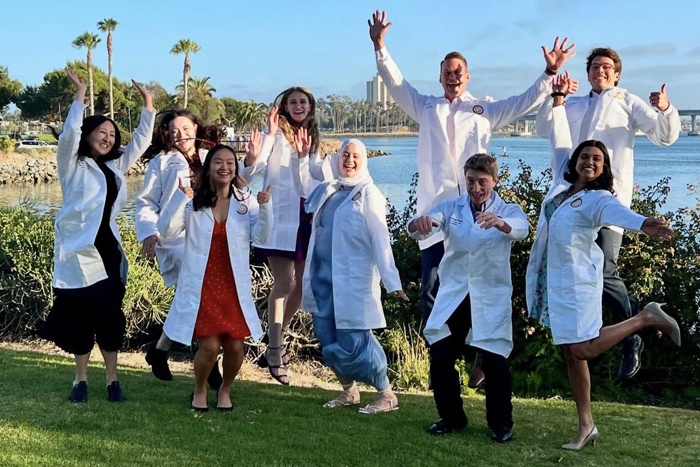Fostering Connection Among Medical Trainees
Residents and Fellows Care for One Another Through Peer Support Program

First-year residents in the Department of Family Medicine including Alexandra Grossman Moon, M.D., M.S.W., fourth from left.
We are living in an unprecedented time. We literally have the world at our fingertips with computers, cell phones and other technology that can connect us instantly with people on the other side of the world, yet many of us feel disconnected and alone at times.

Alexandra Grossman Moon, M.D., M.S.W., and her husband on Match Day when she learned she would be completing a residency at UC San Diego School of Medcine.
The WE CARE Graduate Medical Education (GME) Physician Peer Support Program at University of California San Diego School of Medicine exists to help bridge the gap for medical trainees to connect, share challenges and support one another. Alexandra Grossman Moon, M.D., M.S.W., first-year resident in the Department of Family Medicine, is proud to be a peer supporter at School of Medicine.
“Research has shown time and time again that the prevalence of mental health difficulties, including depression, anxiety and burnout, is higher in medical trainees than it is in our peers in other professions,” said Grossman Moon. “Given this, as well as the fact that medical training is a unique and challenging path, I was encouraged to become part of the peer support team as a way to normalize these difficult experiences and help my peers navigate their struggles in the way they feel will serve them best.”
Prior to beginning medical school, Grossman Moon completed a Bachelor of Science in Psychology at Yale University, then went on to complete a Master of Social Work at the University of Southern California.
“During my time in social work, I saw firsthand the positive impact that not only therapeutic interventions, but also having a listening ear and avenue to share their story had on each of my clients,” she said.
Being that listening ear for her peers is not a new role for Grossman Moon. She was involved in peer support advocacy as a medical student as well. Witnessing the benefits of that program solidified her resolve to be involved in a similar program as a resident.

Grossman Moon tries to make intentional time each day to keep herself grounded, including spending time with her dog.
“Growing the peer support team at UC San Diego ensures that there is a diverse group of individuals who can provide support and further normalize asking for help,” she noted. “All of us struggle at different points in time throughout our lives to various degrees and keeping it bottled up inside can hurt us both emotionally and physically in the long run. It is also difficult to take care of others if we do not take care of ourselves first, and being in a helping profession, this is especially important to keep in mind.”
To keep herself grounded, Grossman Moon notes that she makes time, whether 15 minutes or a few hours, each day to do something she enjoys. It can be big or small, like taking a walk with her husband and dog or watching some “junky” television show or even attempting, and usually failing she says, to cook a new recipe for dinner. All that matters is making intentional time for herself.
There are currently 25 trained GME physicians who are part of the peer support program. They are available to other residents and fellows to talk about a variety of topics including burnout, isolation, couple and family challenges, transitions, workplace conflicts, time management, work-life balance, self-confidence and so much more.
Available to all residents and fellows at UC San Diego, the WE CARE GME Physician Peer Support Program offers confidential peer support sessions through a phone call, in-person meeting or via Zoom. Information on how to request support can be found on the GME website.
— Joyce Pritchett
Communications Specialist, UC San Diego School of Medicine
